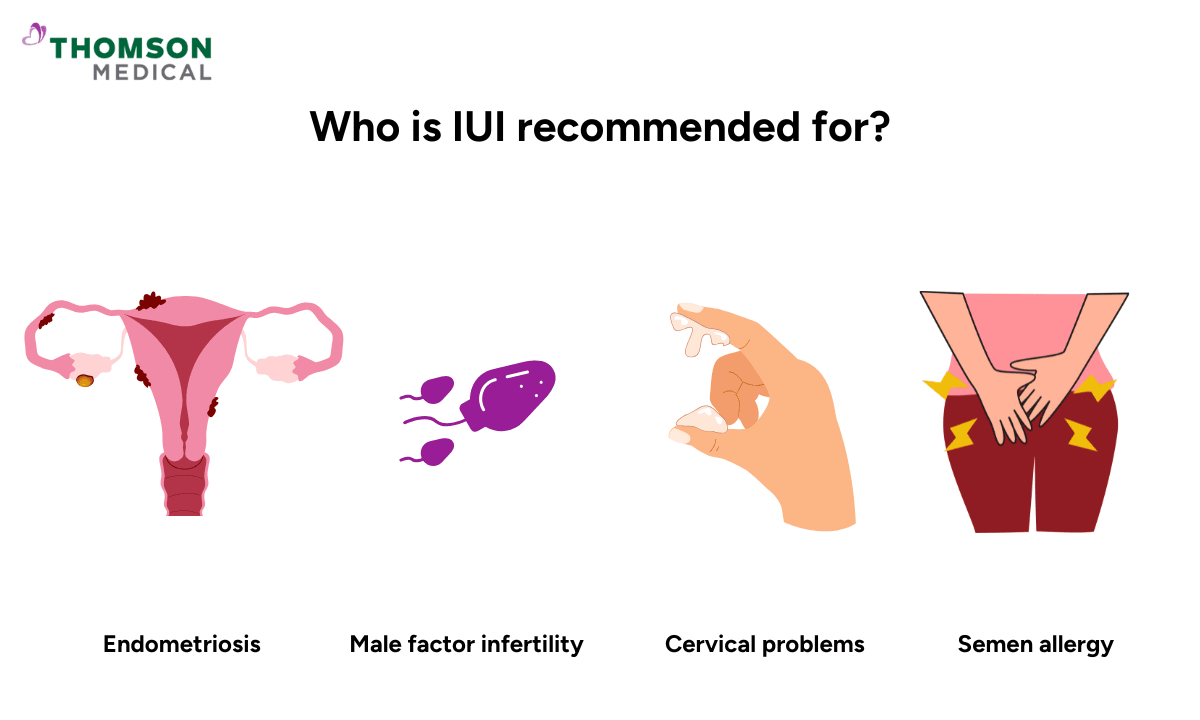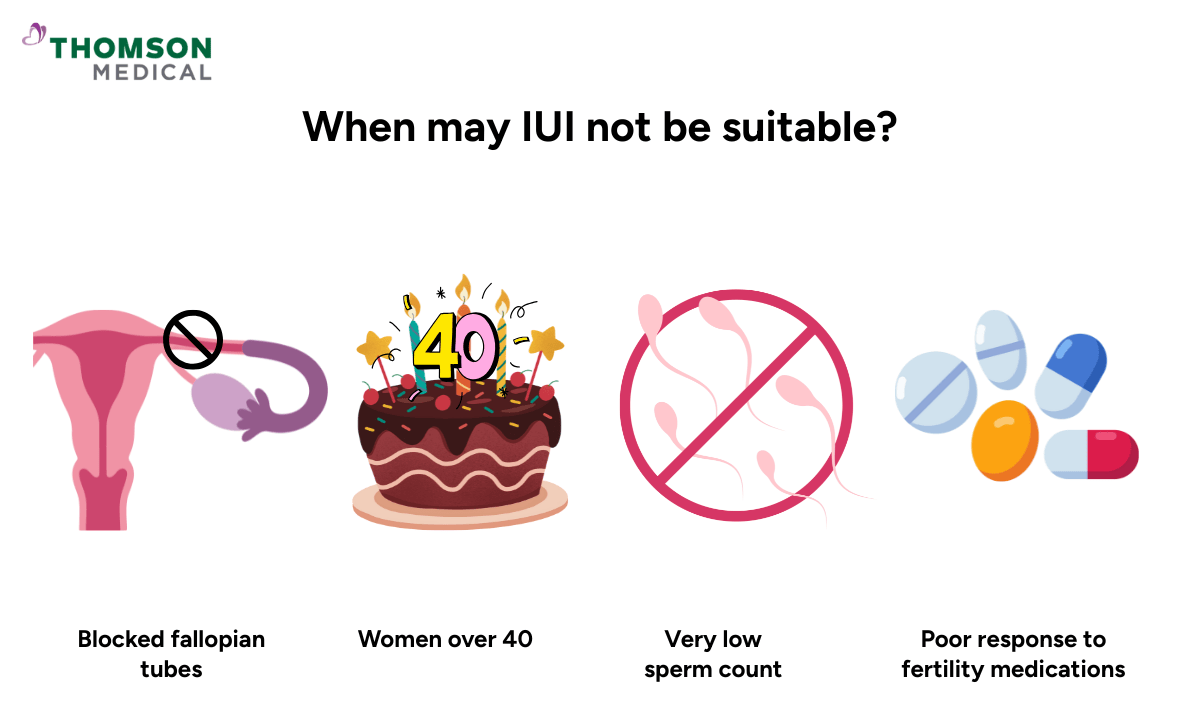Trying to conceive can be an emotional journey, and it’s normal to feel uncertain or overwhelmed when you’re not sure what to do next. You’re not alone – many people exploring IUI feel exactly the same way.
Learning when IUI is recommended can help you understand your options more clearly and make a decision that feels right for you.
What is IUI?
In natural conception, sperm travels through the cervix to reach the eggs in your fallopian tubes, where fertilisation happens.
Intrauterine insemination (IUI) is a gentle fertility treatment designed to help you on your journey to conception. During this procedure, specially selected sperm are carefully placed directly into your uterus, giving them a helpful head start and boosting your chances of conceiving.
IUI treatment works differently:
Sperm collection and preparation:
The sperm are collected and carefully prepared in the lab to select the most motile sperm (sperm that can move well).
Placement into the uterus:
These prepared sperm are then gently placed into your uterus using a thin, comfortable tube, placing them closer to where the egg is waiting.
This shorter journey helps improve your chances of conception, giving you the best possible opportunity to get pregnant.
Who is IUI recommended for?

Many people exploring fertility treatment aren’t sure whether IUI is a good fit for their situation. To help you understand where it may be useful, doctors typically recommend IUI in cases such as:
Unexplained infertility:
IUI is often recommended when a doctor cannot find a specific cause of infertility. If you've been trying to conceive without success and tests haven't revealed a clear reason, IUI can be a good first step to help you conceive.
Infertility related to endometriosis:
Infertility may occur when the lining of the endometrium grows outside the uterus, known as endometriosis. IUI helps improve the chances of becoming pregnant in women with endometriosis.
Cervical-related infertility:
Cervical problems such as thick cervical mucus or cervical scarring may cause infertility. IUI bypasses the cervix and goes directly into the uterus.
Male factor infertility:
Some people have issues with their sperm count, size, shape, or overall quality. IUI selects the healthiest sperm for the procedure. It can also be used when one partner cannot sustain an erection or is unable to ejaculate.
Semen allergy:
In rare cases, people are allergic to their partner's semen. Semen may cause itchiness and swelling in the vagina. IUI removes the proteins that cause this allergic reaction during the sperm preparation process.
Use of donor sperm:
For couples with severe male infertility, IUI can be performed using donor sperm.
Our IUI specialists in Singapore
Loading...
When is IUI recommended?
It can be difficult to decide when it’s the right time to move from trying naturally to seeking fertility treatment such as IUI.
As a general guide, doctors suggest considering IUI after a year of trying to conceive if you’re under 35, or after six months if you’re over 35. If you’ve reached this point, it may be worth discussing IUI with your doctor to see if it’s suitable for you.
If you’re not sure whether it’s time to start IUI or continue trying naturally, request an appointment with a Thomson Medical fertility specialist. Our specialist will review your history, guide you through your options, and help you make an informed decision about your next fertility journey.
When may IUI not be suitable?

While IUI can be helpful for many people, there are situations where another treatment may offer a better chance of success. Understanding when it may not be suitable can give you clarity and help you focus on treatments that offer you the best chance of success. Your doctor will carefully walk you through this process while taking your personal situation into account.
Blocked fallopian tubes:
IUI requires sperm to reach the eggs in the fallopian tubes before fertilisation can occur. If you have blocked tubes, IUI might not be effective for you.
Women over 40:
While IUI can still work for some women over 40, success rates do decline as you get older. Your doctor will discuss whether IUI is worth trying based on your individual circumstances.
Very low sperm count:
When sperm count is extremely low (a condition called severe oligospermia) or there is no sperm in the ejaculate at all (azoospermia), IUI may not be the best option.
Unexplained infertility with poor response to fertility medications:
However, if you have unexplained infertility and fertility medications don't help you ovulate properly, IUI may not be the right option. This suggests the issue may involve more than just ovulation or sperm delivery, and other treatments like IVF might be more suitable.
When to move on from IUI to IVF?
If IUI hasn't been successful for you, it doesn't mean your journey ends here. Your doctor may recommend switching from IUI to in vitro fertilisation (IVF) after 3–6 failed IUI cycles. The decision depends on your individual circumstances and response to treatment.
If you're unsure whether it's time to transition from IUI to IVF, request an appointment with a Thomson Medical fertility specialist. Our specialist will review your past IUI cycles, assess your current fertility factors, and help you make an informed, timely decision about your next steps.
How to decide if IUI is right for you?
Choosing a fertility treatment isn’t always straightforward, and many people find this stage challenging.
Understanding factors like your diagnosis, age, and personal preferences can make things feel a little clearer. You don’t have to make this decision on your own – your fertility specialist will help you weigh each factor and choose a path that feels right for you.
FAQ
How do you know if you need IUI?
IUI treatment works best for women with unexplained infertility, women with ovulation problems, and men with ejaculation disorders. If you've been trying to conceive without success, a fertility specialist will assess your situation to determine if IUI is appropriate.
How many IUI cycles should I try?
For women under 35, doctors generally recommend trying 3–6 IUI cycles before considering IVF. The success rate tends to be highest in the first few attempts. For women aged 35 and above, it is recommended to try three cycles before moving to IVF, as the success rate decreases with age.
Who might be suited for IUI?
A good candidate for IUI treatment includes women with unexplained infertility, mild male infertility, and those with ovulation disorders such as PCOS. People using donor sperm are also good candidates. Those with blocked fallopian tubes, advanced maternal age, severe male infertility, such as severe azoospermia, or unexplained infertility with failed IUI cycles are not suitable for the treatment.
Can IUI help with blocked fallopian tubes?
No, IUI treatment may not be effective for those with blocked fallopian tubes. Sperm will meet the egg in the fallopian tube for fertilisation to occur. If the tubes are blocked, the sperm cannot reach the egg even though they've been placed in the uterus. In this case, IVF would be a more suitable option.
Is IUI effective for PCOS?
IUI treatment can be effective for PCOS if combined with medications like clomiphene citrate or letrozole to help with ovulation. IUI is less invasive than IVF and can be a first step for those with PCOS. A fertility specialist will monitor your menstrual cycle to time the procedure correctly.
Is IUI recommended after miscarriage?
IUI treatment can be an option after miscarriage if you're experiencing difficulty conceiving or have had multiple miscarriages. It's worth noting that IUI itself doesn't reduce the risk of future miscarriages, but it can help with conception. A fertility specialist will assess your individual situation and may recommend additional testing before proceeding with treatment.
What is the best age range for IUI to work?
While there is no single best age range for IUI treatment to work, it is generally recommended before the age of 40. IUI before the age of 40 has a higher success rate than above the age of 40. As a person ages, both egg quantity and quality decline. This affects the overall success rate of fertility treatment. A fertility specialist will consider your age and other factors when recommending treatment options.
The information provided is intended for general guidance only and should not be considered medical advice. For personalised recommendations and tailored advice based on your unique situations, please consult a specialist at Thomson Medical. Request an appointment with Thomson Medical today.
References:
Allahbadia, G. N. (2017). Intrauterine Insemination: Fundamentals Revisited. The Journal of Obstetrics and Gynecology of India, 67(6), 385–392. https://doi.org/10.1007/s13224-017-1060-x
Homburg, R. (2022). IUI is a better alternative than IVF as the first-line treatment of unexplained infertility. Reproductive biomedicine online, 45(1), 1-3.
https://www.rbmojournal.com/article/S1472-6483%2821%2900615-5/fulltext
For more information, contact us:
Thomson Fertility
- Paragon: 6252 7766
Thomson Specialists (Women's Health)
Request an Appointment